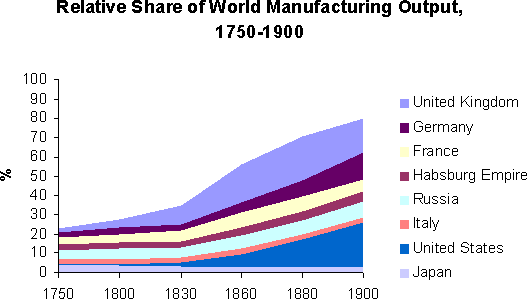Deleted member 93645
How could Russia fully industrialize, to Germany or Britain levels, in the 19th century?
To the contrary of certain popular Western memes, Russian Empire was like the 4th or 5th most industrialised nation of the 19th century:How could Russia fully industrialize, to Germany or Britain levels, in the 19th century?

To the contrary of certain popular Western memes, Russian Empire was like the 4th or 5th most industrialised nation of the 19th century:

(This graph puts it behind the Habsburg Empire, but I've seen other sources placing it ahead)
Even with a POD like earlier freeing of the surfs (this was considered throughout Russia's history at various times) I'm not sure if you could get Russia even more industrialised given restrictions placed on it by geography (e.g.: vast area, so you need a sprawling railway network to connect manufacturing hubs, etc.)
Are you sure about that graphic? Though seeing the UK, France and Germany ahead of the US seems correct, I thought that by 1900 the US was well ahead of both Austria and Italy. Please correct me if I'm mistaken.
That's nice dear.Russia had a factor of 4 population growth in the 19c, even more than Britain, and was the most populous country outside China and India from the late 18c until the breakup of the USSR. France grew by a factor of 1.4, the lowest in Christian Europe, and still managed to expand its share of world manufacturing (though not of European manufacturing). If you measure GDP per capita, for which there's reasonably good data for the late 19c, Russia was poorer than every single Western European country, often by a large margin. Per the Angus Maddison database, its GDP per capita in 1990 dollars in 1900 was $1,237, vs. $4,492 in the UK, $2,985 in Germany, $2,876 in France, and $4,091 in the US.
That's nice dear.
The GDP per capita of 19th century Russia is however irrelevant to whether or not Russia was the 4th-5th most industrialized nation of the time-period. The GDP per capita of modern People's Republic of China is still very low but I doubt you'd argue that China isn't one of the industrial centers of today's world.
(P.S.: also, having a large & growing population isn't a big motivator for industrialization)
Way to undermine your own argument2016 is not 1900. In 2016, China has a GDP per capita of about $15,000, and the US $55,000; subsistence level is $500, and even with non-subsistence agriculture, the large bulk of China's economic production is industrial or related services. In 1900, the UK's GDP per capita was, in today's terms, $6,000, and Russia's was less than $2,000. Even though Russia was well above subsistence, a lot of its economy was still agrarian.
The UK was never the world's highest-GDP country. China remained number 1 until overtaken by the US in the late 19c; Britain overtook it only after the US did. This despite the fact that for many decades the UK had the world's highest manufacturing capacity.
I said "large & growing population isn't a big motivator for industrialization", not that it was the ONLY factor that determines whether a country industrializes or not.The US went from 5.2 million people in 1800 to 76 million in 1900. Somehow, it managed to overtake Britain's GDP per capita in 1906.